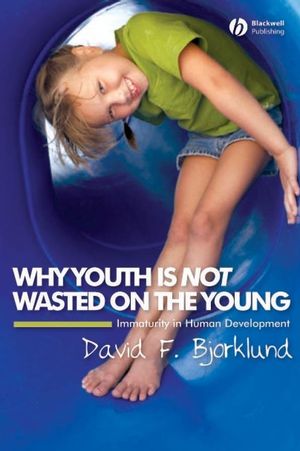Why Youth is Not Wasted on the Young: Immaturity in Human DevelopmentISBN: 978-1-4051-4952-5
Paperback
288 pages
April 2007, Wiley-Blackwell
 This is a Print-on-Demand title. It will be printed specifically to fill your order. Please allow an additional 10-15 days delivery time. The book is not returnable.
|
||||||
Preface vii
Acknowledgments xi
1 The Benefits of Youth 1
Rushing through Childhood 3
Views of Development 5
A Darwinian Perspective 14
I Come Not to Praise Immaturity 20
2 The Youngest Species 21
A Brief Look at Human Evolution 23
The Evolution of Childhood 36
Timing is Everything 44
The Youngest Species 52
3 The Slow Rate of Growing Up 55
The Gamble of Delayed Development 56
Big Brains, Social Complexity, and Slow Development 58
Cooperating and Competing 62
Family Matters 63
Slow Growth and Brain Plasticity 65
Developmental Plasticity and Evolution 83
When Slow is Fast Enough 84
4 Adapting to the Niche of Childhood 87
The Benefits of Limitations 89
See Things My Way 93
Learning Language 101
How Do Adults View Children’s Immature Thinking? 106
Adapting to Childhood 109
5 The Advantages of Thinking You’re Better than You Are
111
The Development of Metacognition – Knowing What We Know
113
Some Benefits of Less-Than-Perfect Metacognition 128
When We Deal with Children 135
Know Thyself, But Not Too Well 136
6 Play: The Royal Road through Childhood 139
What is Play? 142
The Adaptive Value of Play 144
Children Playing, Children Learning 147
Play it Again, Kid 161
7 The Most Educable of Animals 163
The Myth of “Earlier is Better” 169
Prenatal Learning 172
Early (Postnatal) Learning 176
Developmentally Appropriate Practices in Early Education 182
Stress in the Schoolhouse 189
Old Brain, New Curriculum 197
8 The Changing Face of Childhood 199
Pushing Children through Childhood 201
A Brief History of Childhood 204
The Costs of Ignoring Immaturity: The Well-being of America’s Children 211
The Independent Human Juvenile: A New View of Childhood? 216
Racing to Adulthood, Prolonging Adolescence 218
Epilogue: Homo Juvenalis 221
Revisiting Childhood 222
Visiting Adulthood 223
Notes 227
References 239
Index 267



